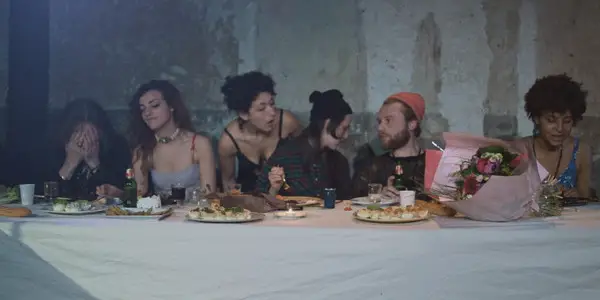Tribeca Film Festival 2023: APOLONIA, APOLONIA

Payton McCarty-Simas is a freelance writer and artist based in…
It may seem like an ambitious prospect for a filmmaker to take “life” and “art” as her stated subject, but that is precisely the feat Lea Glob has pulled off with her tender new documentary, Apolonia, Apolonia. Begun as a film school assignment to “depict a person,” the film that results spans thirteen years and many changes in circumstance in the life of French-Danish painter Apolonia Sokol, then a young art school student herself. Near the beginning of the film, Glob asks Apolonia how her latest painting “project'” is coming along. Apolonia grimaces by way of reply, telling the director that she doesn’t like the idea of a “project” at all, preferring to see her work as a “continuation,” that “began before my birth and never stops”
That notion is carried through in Glob‘s film, which gives the impression of having been cut from a virtually endless flow of footage that intimately encapsulates the breadth of Apolonia‘s experience: at one point, the filmmaker records Apolonia and her professed “soulmate,” the Ukrainian feminist activist Oksana Shachko, as they fall asleep. Their conversation peters out, their cat settles down, and the two begin to breathe evenly, a progression (depicted across three jump cuts) that’s so intimate as to feel genuinely startling, as though Glob had herself curled up to rest behind her ever-present, yet entirely anti-voyeuristic camera. The filmmaker’s embeddedness in Apolonia‘s world, and art’s embeddedness in both women’s lives, work in tandem to paint a portrait of what David Lynch describes as “The Art Life” that eventually blends into something more truthful that could perhaps be more accurately described as “art, life.”
Bohemian Rhapsody
The documentary was described by John Grierson as a poetic medium that “reveals the flow of life,” and here Glob‘s dedication to cinematic praxis is rivaled only by Apolonia‘s parent’s own: In the film, Apolonia‘s “continuation” does indeed begin before her own birth (which we see) with her conception (which we also see, to borrow a phrase from Boogie Nights, “right here on video tape”).

Apolonia, we quickly learn, was raised in the bohemian milieu of Parisian anarchist performance art, living in her parents’ cavernous, dilapidated theater surrounded by performers of all stripes. Glob‘s infatuation with the milieu is undeniably well-founded, and when Apolonia, from this charmed vantage point, describes feeling like “a princess in a castle everyone is jealous of” we understand why: “If I ever imagined Bohemia, this is what it looked like,” Glob marvels over footage of an enormous banquet in the performance space. It’s hard to disagree.
Art, Life
And yet, making anarchist performance art does not pay, and the theater into of disrepair– and into the hands of the debt collectors, leaving the merry band of activists and artists out on the street. At this point, the paradigm begins to shift. What could have been an idealized portrait of bohemia scorned opens out into the alien world of commercial art and daily subsistence for a woman whose dreams exceed this dreary schema.

What results is an engrossing, often painful, always warm portrait of the challenges of wanting to make art in a world hostile to the prospect: her (male) teachers denigrate her, her (male) patrons control and belittle her, her friends and family spread out across the globe. Apolonia, Apolonia often feels like a love letter to women and the art and families they make in this hostile world, supporting and caring for each other. Glob‘s own life slips in only subtly for most of the movie before taking on new resonance in the final passages, contributing to a welcome feeling of cinematic habitation.
Conclusion
There are certainly challenges to this form of filmmaking: structuring the unstructured transience of a life lived is a tall order, and certain beats show the strain of conforming to the strictures of narrative, relying on expository voice-over that feels at odds with the personal project at hand. However, these moments are few and far between. More often, it feels like the viewer is getting to know Apolonia deeply – and what a pleasure.
Watch Apolonia, Apolonia
Does content like this matter to you?
Become a Member and support film journalism. Unlock access to all of Film Inquiry`s great articles. Join a community of like-minded readers who are passionate about cinema - get access to our private members Network, give back to independent filmmakers, and more.
Payton McCarty-Simas is a freelance writer and artist based in New York City. They grew up in Massachusetts devouring Stephen King novels, Edgar Allan Poe stories, and Scooby Doo on VHS. Payton holds a masters degree in film and media studies from Columbia University and her work focuses on horror film, psychedelia, and the occult in particular. Their first book, One Step Short of Crazy: National Treasure and the Landscape of American Conspiracy Culture, is due for release in November.













